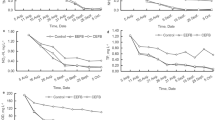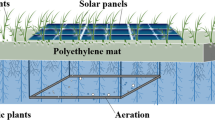Abstract
The artificial ecological floating bed is widely used in rivers and lakes to repair and purify polluted water. However, the water flow pattern and the water level distribution are significantly changed by the floating beds, and the influence on the water flow is different from that of aquatic plants. In this paper, based on the continuous porous media model, a moveable two-layer combination model is built to describe the floating bed. The influences of the floating beds on the water flow characteristics are studied by numerical simulations and experiments using an experimental water channel. The variations of the water level distribution are discussed under conditions of different flow velocities ( v= 0.1 m/s, 0.2 m/s, 0.30 m/s, 0.4 m/s), floating bed coverage rates (20%, 40%, 60%) and arrangement positions away from the channel wall ( D = 0 m, 0.1 m, 0.2 m). The results indicate that the flow velocity increases under the floating beds, and the water level rises significantly under high flow velocity conditions in the upstream region and the floating bed region. In addition, the average rising water level value (ARWLV) increases significantly with the increase of the floating bed coverage rate, and the arrangement position of floating beds in the river can also greatly influence the water level distribution under a high-flow velocity condition (v ≥ 0.2 m/ s).
Similar content being viewed by others
References
ZHOU Xiao-hong, WANG Guo-xiang. Nutrient concentration variations during oenanthe javanica growth and decay in the ecological floating bed system[J]. Journal of Environmental Sciences, 2010, 22(11): 1710–1717.
XIAN Q., HU L. and CHEN H. et al. Removal of nutrients and veterinary antibiotics from swine wastewater by a constructed macrophyte floating bed system[J]. Journal of Environmental Management, 2010, 91(12): 2657–2661.
LI X.-N., SONG H.-L. and LI W. et al. An integrated ecological floating-bed employing plant, freshwater clam and biofilm carrier for purification of eutrophic water[J]. Ecological Engineering, 2010, 36(4): 382–390.
SUN L., LIU Y. and JIN H. Nitrogen removal from polluted river by enhanced floating bed grown canna[J]. Ecological Engineering, 2009, 35(1): 135–140.
CAO Wen-ping, WANG Bing-bing. Application status quo and development direction of ecological floating bed[J]. Industrial Water Treatment, 2013, 33(2): 5–9(in Chinese).
HUANG L., ZHUO J. and GUO W. et al. Tracing organic matter removal in polluted coastal wasters via floating bed phytoremediation[J]. Marine pollution Bulletin, 2013, 71(1-2): 74–82.
HUAI Wen-xin, ZHAO Lei and LI Dan.et al. Experimental analysis of vertical profiles of stream-wise velocities in flows through vegetation with PIV[J]. Journal of Experiments in Fluid Mechanics, 2009, 23(1): 26–30(in Chinese).
STOESSER T., SALVADOR G. and RODI W. et al. Large eddy simulation of turbulent flow through submerged vegetation[J]. Transport in Porous Media, 2009, 78(3): 347–365.
HUAI Wen-xin, WU Zhen-lei and QIAN Zhong-dong et al. Large eddy simulation of open channel flows with non-submerged vegetation[J]. Journal of Hydrodynamics, 2011, 23(2): 258–264.
KOTHYARI U. C., HAYASHI K. and HASHIMOTO H. Drag coefficient of unsubmerged rigid vegetation stems in open channel flows[J]. Journal of Hydraulic Research, 2009, 47(6): 691–699.
WANG C., WANG P. Hydraulic resistance characteristics of riparian reed zone in river[J]. Journal of Hydrologic Engineering, 2007, 12(3): 267–272.
SANJOU M., NEZU I. Turbulence structure and coherent motion in meandering compound open-channel flows[J]. Journal of Hydraulic Research, 2009, 47(5): 598–610.
ZHU Hong-jun, ZHAO Zhen-xing. Influences of cropping loops in ecological river on hydraulic behavior of flow[J]. Hydro-Science and Engineering, 2007, (1): 31–35(in Chinese).
WANG Pei-fang, WANG Chao and ZHU David. Z. et al. Hydraulic resistance of submerged vegetation related to effective height[J]. Journal of Hydrodynamics, 2010, 22(2): 265–273.
XU Z. H., MA G. W. and LI S. C. A graph theoretic pipe network method for water flow simulation in a porous medium: GPNM[J]. International Journal of Heat and Fluid Flow, 2014, 45(2): 81–97.
ALVES B., BARLETTA A. and HIRATA S. et al. Effects of viscous dissipation on the convective instability of viscoelastic mixed convection flows in porous media[J]. International Journal of Heat and Mass Transfer, 2014, 70(3): 586–598.
WU Shi.qiang, TONG Zhong-shan and ZHOU Hui et al. Simulation methods for accumulation patterns floating debris in hydropower stations[J]. Advance in Science and Technology of Water Resources, 2010, 30(2): 24–28.
Author information
Authors and Affiliations
Corresponding author
Additional information
Project supported by the Major Science and Technology Program for Water Pollution Control and Treatment (Grant No. 2012ZX07101-008), the National Science Fund for Distinguished Young Scholars (Grant No. 51225901), the Research Fund for Innovation Team of Ministry of Education (Grant No. IRT13061) and the Jiangsu Province QingLan Project.
Biography: RAO Lei (1975-), Male, Ph. D., Associate Professor
Rights and permissions
About this article
Cite this article
Rao, L., Qian, J. & Ao, Yh. Influence of artificial ecological floating beds on river hydraulic characteristics. J Hydrodyn 26, 474–481 (2014). https://doi.org/10.1016/S1001-6058(14)60054-8
Received:
Revised:
Published:
Issue Date:
DOI: https://doi.org/10.1016/S1001-6058(14)60054-8




